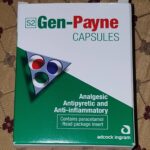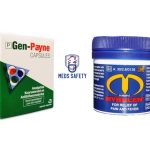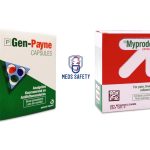Gen Payne: Ingredients, Uses, Dosage, Side Effects, Warning

Gen-Payne Capsule is a combination analgesic containing the following active ingredients; paracetamol, codeine, and ibuprofen. Studies have shown that combining paracetamol and other NSAIDs could give a theoretically synergistic analgesic effect according to already known or assumed mechanisms of action. Synergism is defined as an additive or supra-additive effect not achieved by one of the drugs alone.
NSAIDs, such as ibuprofen, have analgesic, antipyretic, and anti-inflammatory actions. They inhibit the synthesis of prostaglandins by inhibiting cyclo-oxygenase (COX), present as COX-1 and COX-2. Their analgesic and anti-inflammatory effects are a consequence of COX-2 inhibition.
Despite its widespread use, the mode of action of paracetamol is yet to be fully determined, although a centrally mediated analgesic action is thought likely. Paracetamol has minimal anti-inflammatory activity, implying a different mode of action from that of NSAIDs.
Codeine belongs to a class of medications called opiate (narcotic) analgesics and to a class of medications called antitussives. When codeine is used to treat pain, it works by changing the way the brain and nervous system respond to pain.
The combination of 3 analgesics with different modes of action results in an additive rather than a synergistic effect; the efficacy of the combination in acute pain is roughly similar to the sum of the efficacies of individual agents.
What is Gen-Payne Capsules used for?
Gen-Payne Capsule is used for the treatment, control, prevention, & improvement of the following diseases, conditions and symptoms:
- Toothache
- Headache
- Menstruation pain
- Back pain
- Pain in teeth
- Muscles pain
- Joint pain
- Pain in body
- Flu
- Analgesic
How is Gen-Payne capsule taken?
For treatment of mild to moderate pain with or without fever, 1-2 capsules of Gen-Payne is taken every 4 hours. Users have reported thrice a day and twice a day as the most common frequency of using Gen-Payne capsule. Please follow your doctor’s advice on how often you need to use Gen-Payne capsule. Do not exceed 12 capsules in 2 hours. This medication contains ibuprofen, excess ibuprofen can cause serious nervous system problems such as seizures (neurotoxicity), low blood pressure (hypotension), low temperature (hypothermia), and other severe metabolic problems.
You should not take if:
- Your doctor has advised you not to
- You are allergic to codeine
- You are not able to take the paracetamol or ibuprofen provided with the medication
- You need to do anything other than sleep for the next four hours.
- You may be tested for drugs of abuse.
How long should I take Gen-payne Capsules?
If you have bought combined ibuprofen, paracetamol and codeine from a pharmacy, do not use it for more than 3 days. If you still have pain, talk to your pharmacist or doctor. It’s important to ask them for advice about ongoing pain relief.
What if I forget to take it?
Take the missed dose as soon as you remember, unless it’s almost time for your next dose. In this case, skip the missed dose and take your next one as normal. Never take a double dose of Gen-payne Capsules to make up for a forgotten one.
What if I take too much?
Taking too much combined paracetamol ibuprofen and codeine can be dangerous.
It can cause side effects, such as:
- feeling very sleepy, sick or dizzy
- finding it difficult to breathe or changes in your heart rate (it can become slower or faster)
- becoming unconscious, if you take a lot
The amount of Gen-payne Capsules that can lead to an overdose varies from person to person.
What are the side effects of Gen-Payne Capsule?
The following is a list of possible side-effects that may occur from all constituting ingredients of Gen-Payne Capsule. This is not a comprehensive list. These side-effects are possible, but do not always occur. Some of the side-effects may be rare but serious. Consult your doctor if you observe any of the following side-effects, especially if they do not go away.
- Drowsiness
- Abdominal pain
- Rashes
- Insomnia
- Dizziness
- Nervousness
- Swollen facial features
- Constipation
- Feeling sick
- Itching
- Diarrhea
- Dry mouth
- Fatigue
- Abdominal cramps
- Lightheadedness
- Sedation
- Shortness of breath
- Nausea
- Vomiting
- Sweating
- Allergic reactions
- Euphoria
- Dysphoria
- Pruritis
- Faintness
- Flushing
- Hypotension
- Palpitations
- Syncope
- Anorexia
- Gastrointestinal distress
- Pancreatitis
- Anxiety
- Headache
- Shakiness
- Somnolence
- Vertigo
- Visual disturbances
- Weakness
- Rash
- Respiratory depression
- Circulatory depression
- Respiratory arrest
- Shock
- Cardiac arrest
- Skin rash
- Bleeding from the skin or nose
- Abnormal blood counts
- Severe skin reactions
- High blood pressure
- Heartburn
- Loose motions
- Liver problems
- Kidney problems
- Gas
- Severe skin allergies
- Flu
- Feeling of sickness
- Skin reddening
- Liver damage
- Abnormalities of blood cells
- Liver toxicity
- Less white blood cells
- Acute renal tubular necrosis
- Blood dyscrasias
Gen-Payne capsule may also cause side effects not listed here. If you notice other side effects not listed above, contact your doctor for medical advice. You may also report side effects to your local food and drug administration authority.
Is Gen-Payne same as Ibuprofen?
No, Gen-Payne is not the same as ibuprofen. Gen-Payne is a combination medication each capsule contains Codeine phosphate 10 mg, Ibuprofen 200 mg, and Paracetamol 250 mg.
On the other hand, ibuprofen is a nonsteroidal anti-inflammatory drug (NSAID) that is also used as a pain reliever, fever reducer, and anti-inflammatory agent. It works by reducing inflammation and blocking the production of certain chemicals in the body that cause pain and fever.
While both Gen-Payne and ibuprofen can provide pain relief and reduce fever, they contain different active ingredients and work in different ways. It’s important to read the packaging or label of any medication and follow the recommended dosage instructions and precautions. If you have specific concerns or questions about using Gen-Payne or ibuprofen, it’s best to consult with a healthcare professional or pharmacist for personalized advice based on your individual circumstances.
Gen-Payne Capsule Safety Information
Codeine-containing medicines like Gen-Payne Capsule should only be used to treat acute (short-lived) moderate pain in children above 12 years of age, and only if it cannot be relieved by other painkillers such as paracetamol or ibuprofen, because of the risk of respiratory depression associated with codeine use.
Gen-Payne capsule contains an opiate (codeine) which comes with a high risk of its users developing a tolerance and eventually a dependence on it. Although many people begin using codeine to relieve a legitimate condition, it is frequently abused as tolerance develops. Many codeine users begin to turn to the drug to cope with all of their physical pain and eventually their emotional pain as well.
Gen-Payne Capsule should not be used at all in children (aged below 18 years) who undergo surgery for the removal of the tonsils or adenoids to treat obstructive sleep apnoea, as these patients are more susceptible to respiratory problems.
The risk of side effects with Gen-Payne Capsule may also apply to adults. Codeine should therefore not be used in people of any age who are known to be ultra-rapid metabolisers nor in breastfeeding mothers (because codeine can pass to the baby through breast milk).
Short-term studies of Gen-Payne Capsule in acute pain have not identified specific safety concerns other than those already known to be associated with the individual active ingredients.
However, one study of 13 weeks found use of combined paracetamol/ibuprofen may increase the risk of bleeding over and above that associated with the individual drugs, suggesting caution should apply to long-term use.
A retrospective cohort study that analyzed the health insurance records of more than 640,000 patients aged 65 years and older found the combination of an NSAID and paracetamol to be associated with increased risk of hospitalization for gastrointestinal events, compared with either drug alone.
While co-administration with a proton pump inhibitor appeared to mitigate this risk, the combination was still associated with double the risk of hospitalizations compared with paracetamol alone.
While paracetamol is generally well tolerated when used at recommended doses, inadvertent overdose is possible. Advise patients to consider the paracetamol content of all their medicines.
More precautions apply to the use of ibuprofen, especially in the elderly. Use ibuprofen with caution and at the lower end of the dose range in older people and in those with kidney disease, a history of peptic ulcer disease, asthma, pregnancy, hypertension, or heart failure.





